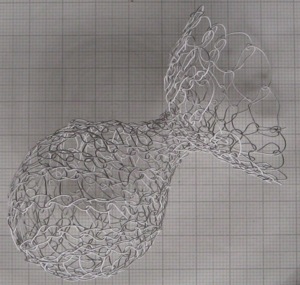conclusions
Series 2 - Conclusions
29/01/08 23:41 Filed in: Testing Materials
A good strong and very open structure was produced in Specimen 6 using the fine wire and freely looping with a crochet hook. This could be used to create very small specimens, where knitting needles could not be manipulated.
The telephone wire needlelace used for Specimen 7 was very tough to work on this scale and could not be knitted or crocheted, but also the banding created a mottled pattern that was not appropriate. The Bamboo paper yarn knitted and crocheted in Specimens 8 and 9 did not have enough body to retain a form, and created too opaque a fabric.
The telephone wire needlelace used for Specimen 7 was very tough to work on this scale and could not be knitted or crocheted, but also the banding created a mottled pattern that was not appropriate. The Bamboo paper yarn knitted and crocheted in Specimens 8 and 9 did not have enough body to retain a form, and created too opaque a fabric.
In Specimen 1 and 2, the finest coated wire at 0.2mm does not have the strength to hold form using crochet and produces a floppy fabric. Specimen 3 is more successful using knitting with fine needles to produce a denser fabric, while still retaining an element of transparency. This will be required to interpret layering. The gel yarn used for Specimen 4 proved difficult – its tackiness making it stick to the needles and itself and causing the sphere to implode. A favourite material, fine paper string, was used for Specimen 5, but couldn’t hold the sphere shape on this scale and the fabric produced was too opaque.
Have chosen to work with the fine coated wire (0.25 and 0.31mm gauge) using knitting and free looping, for it’s ability to hold form and degree of transparency which will interpret layering. Crochet produces too textured a surface in the wire which distracts from the forms. The wire has a ‘springiness’ which brings the organic specimens to life.

